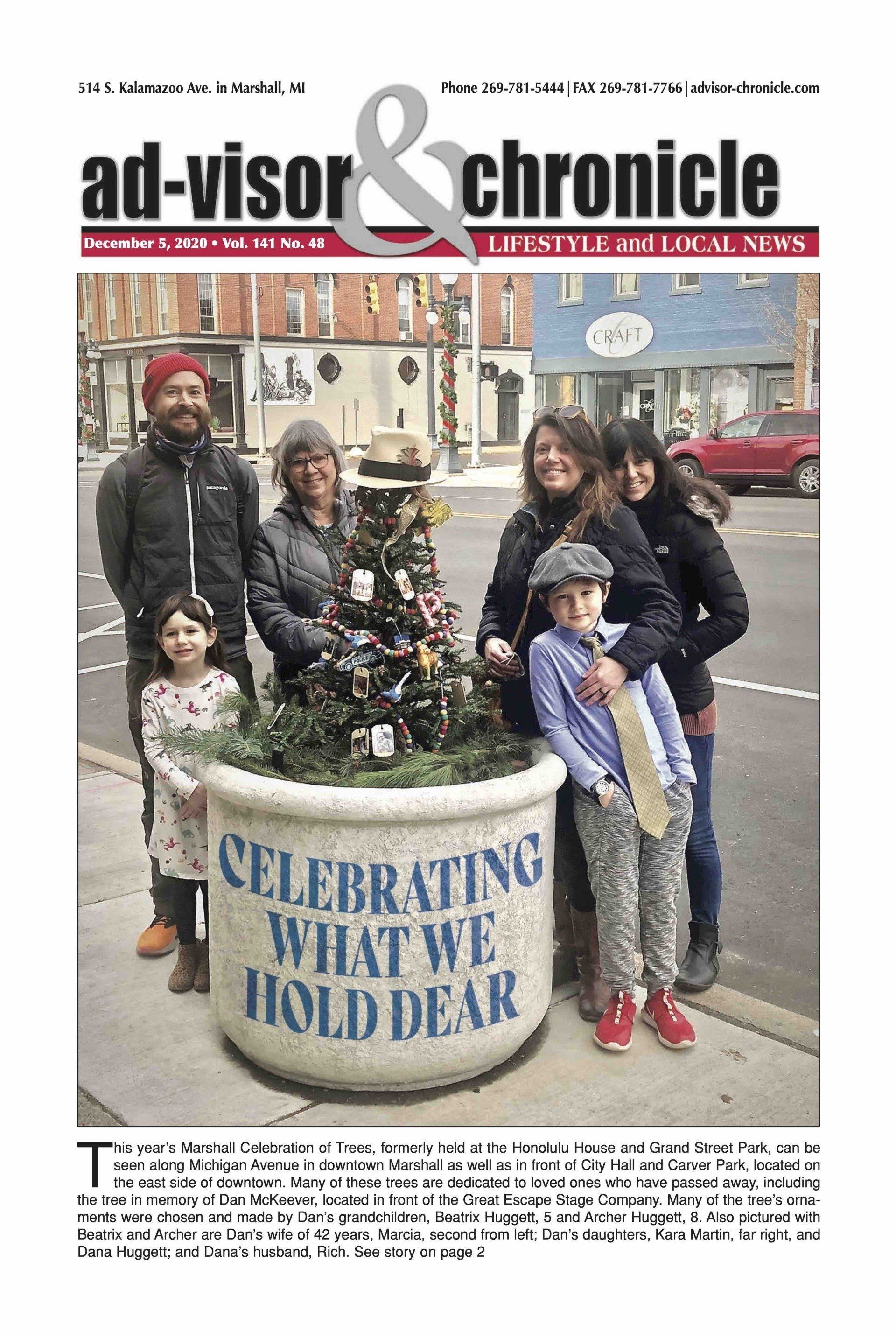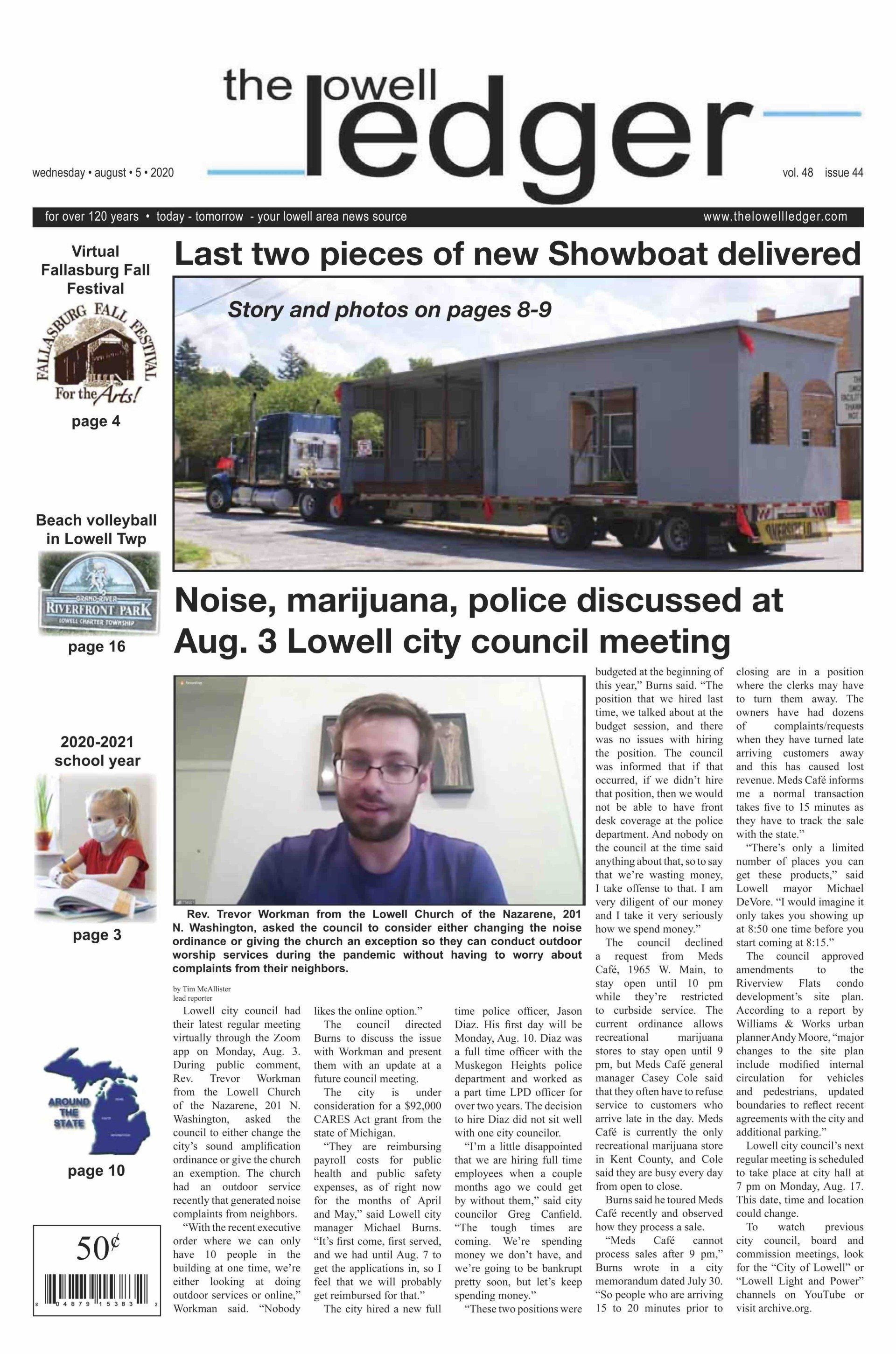Steve Reid remembered for his compassion and caring for people
Elaine Gilbert • January 28, 2021
One of Hastings’ most well-known and beloved citizens, the Rev. Steven Lee Reid, died Saturday at age 69.
With Reid's death, friends say the Barry County community has lost an endearing man who left an inspiring legacy of compassion. He had an expertise for connecting resources through churches and human service agencies to help financially struggling residents. Reid accomplished that through his work for more than 30 years as executive director for nonprofit Love, Inc., which became Barry County Cares in 2014.
Friends often called him Mr. Love because he was such a countywide icon for the agency.
Reid also was known for his insatiable appetite for live music and bringing many well-known and local singers and musicians to Hastings Summerfest stages, as well as creating other musical venues for the public.
Reid struggled with Parkinson's disease for many years. When his condition worsened earlier this month, he was hospitalized. Then he began receiving hospice care at his home where he died while his wife, Joyce, and other family members were by his side.
“I have been so blessed to be part of his life,” Joyce said in a telephone interview. The couple had celebrated their sixth wedding anniversary Jan. 3. Their first date was at Hastings Summerfest in 2014.
“I'm looking at a picture right now of us with Barry McGuire and John York when they were the Summerfest feature,” Joyce said. “Steve finagled the opportunity to have dinner with them the next day. I thought, 'Wow, this guy is pretty cool to hang around with.’ ”
He proposed to her soon after, and she recalled, “I couldn't say no to this guy. We were married the following January [2015]. It's been so nice. He's just been a man who loved me and brought me on board for a fun new world … It's been so good.
“... It was a learning experience with the Parkinson's … He was needing something different for treatment. So, we tried this new way of delivery of the same medicine, and it helped manage the Parkinson shaking,” she said. “He could move much better and get around better and provided us opportunities to travel together to different places around the country. We went back to where he went to college in Southern California and he showed me around … He enjoyed reconnecting with some of his past and being part of Summerfest for many summers after that.
“The friends he made around this community – I've been so honored to get to know them and be a part of their lives ... and getting acquainted with his family. They are fun people to be with and be a part of.”
Reid's first wife, the former Joyce Elaine Schiek, died in 2011. They met in California, and were the parents of Justin and Amber Reid. Ironically, Reid's surviving spouse and his first wife shared the same first and middle names. His surviving spouse is the former Joyce Elaine Gilbert Griffin.
Reid's daughter Amber, who retired in 2019 from the U.S. Air Force and lives near Baltimore, Md., reflected that even though her dad was “obviously a very busy guy, he always made it to my brother's and my school events. We were always doing things as a family, going to church together … He always had time for us.”
Amber recalled that, when she was in high school, her dad would take her to concerts she wanted to attend, even if he didn't care for the style of music and songs of the group performing.
She noted that her father had a unique hobby of keeping lists of the names of every song he heard at concerts and other musical venues. He was known for attending almost every concert that took place within a 50-mile radius of his Hastings home.
“Even if I was just practicing with my flute, he would write down the songs,” Amber said. He was very committed to that, keeping a set-list … He was very detailed at keeping notes about a variety of things. No matter what he did, he did it 100 percent ... whether it was church or if anyone came up to him with an issue, he would run it down and make it happen. He knew who to call.”
Amber, who has kept her maiden name, and her husband have a 10-year-old daughter, Ofelia, and friends remember how proud Reid was to be a grandfather.
Steve Reid was born at Pennock Hospital Feb. 13, 1951, the son of Don and Dorothy Reid, who survives. Don died in 2003.
As far back as kindergarten, Steve Reid was spinning stories, he said in a 1991 Reminder interview. He had fond memories participating in musicals at Hastings High School, such as “The Sound of Music” and “The Most Happy Fella.”
Reid was among the top 10 students when he graduated from Hastings High School in 1969. He graduated summa cum laude when he earned a bachelor's degree in sociology from Southern California College in 1973.
His first job after college was selling air conditioning units until he landed a fifth-grade teaching position at Wilmington Christian School near Long Beach where he taught from 1975 to 1978.
During his spare time when he lived in California, Reid enjoyed performing skits at a Christian night club called The Filling Station.
He served in a number of positions as an ordained minister after the family moved back to Michigan in 1978.
He served as dean of students at Faith Tech Bible School in Scottville while also being the pastor of Smith Corners United Methodist Church. When the school moved to another location, the Reids decided to move to Hastings where he went to work in the former Barry County grants office, and he served as pastor at Peace and Quimby United Methodist churches, located between Hastings and Nashville, until January 1984. That's when he became assistant pastor of Word of Faith Fellowship in Hastings. At another time, he also was youth director at Hastings' First Presbyterian Church.
In 1986, Reid accepted the position of executive director of Love, Inc. Reid always liked to explain that the Inc. was the acronym for “in the name of Christ.” He retired from that position in 2015.
During the early years of the local Love, Inc., Reid helped the organization's founder, Dr. Virgil Gulker of Holland, start other Love, Inc. agencies around the United States. Gulker even mentioned Reid in a book he wrote.
Over the years, Reid was awarded the prestigious Liberty Bell Award from the Barry County Bar Association in 1993, was selected to be grand marshal of the 2012 Christmas parades when organizers thought he was a fitting choice for the parade theme of “Joy to the World,” and was named Hastings High School's Alumnus of the Year in 2014. He received an official proclamation of honor from the City of Hastings in 2018.
When he received the Liberty Bell Award, attorney Bruce Gee made the presentation and said Reid was selected as the year's outstanding citizen because of his commitment to God, his family and the community. Gee said Reid represented a citizen who stood for truth and justice.
Dave Storms, YMCA executive director at the time, also spoke at the county circuit court award gathering, saying Reid “loves God and shows that in everything he does … He loves everyone.”
Reid also had a great love for live music and once said in an interview that a big factor in his love for music was Herb Moyer, his music teacher in Hastings from seventh through 12th grades.
Music at annual Hastings Summerfest events were enlivened by Reid's volunteer service with Steve Steward to book, promote and emcee all the musical groups that performed on multiple stages from 1980 to 2018. Steward joined Reid for more than 20 of those years. Both men were honored in 2018 with official proclamations from the City of Hastings in appreciation for their service to citizens and Summerfest events.
“The teamwork we created was something that I'll certainly miss,” Steward said, calling Reid a good friend. “In the last couple of years, we retired from the Summerfest. Steve helped after I left, but not in the full capacity of booking all the bands.”
Some of the entertainers they booked were national touring and recording artists, including the Byrds and Beatles tribute bands. Others included McGuire, Ray Overholt, Bill Haley's Comets and Bobby Holley.
Another way Reid shared his love for music with the public was when he started a free venue with live music called Musicians' Showcase. For 10 years, the showcases were held twice a month Thursday evenings at the former Arby's restaurant in Hastings. The first showcase was Feb. 28, 1991.
As the volunteer music coordinator, Reid estimated in a 2001 Reminder article, that more than 7,000 songs were performed during the 250 shows of the Showcase's tenure. Songs ranged from country to rock 'n' roll and gospel. Each show was at least two hours long, and the restaurant would nearly be packed.
“It was a great ride,” he said in the article, noting that he loved helping musicians boost their audience exposure.
“From a spiritual side, I know of at least four people who made a profession to accept Christ as their Savior on nights when the Showcase featured Christian music,” he was quoted as saying.
In recent years, Reid revived the Musicians' Showcase for a time at the State Street Diner.
Another passion of Reid's was spending many weekends and evenings in past years sharing his one-man biblical dramas he had written. He would use a monologue form to portray the roles of such biblical notables as Peter, Joseph, Jonah and Noah to area audiences as well as in other towns in Michigan, California, Illinois and even during a mission trip to Mexico.
He especially enjoyed telling the story of Easter as seen through the eyes of Peter, depicting the 3½ years the disciple spent with Jesus. He first presented that drama in 1980 when he was pastor of Peace and Quimby United Methodist churches. By 1991, he had presented that drama about 200 times at various venues, ranging from festivals to nursing homes and conventions.
Another famous figure Reid portrayed for more than 30 years in Hastings was Santa Claus. He enjoyed donning his red suit to visit with children at area businesses during the pre-Christmas season and playing the role of Santa on the Holly Trolley. To enhance riders' holiday spirits, Reid scheduled singers and/or musicians to perform during his stints on the trolley and had plenty of jokes to tell as well.
In the past few years, Reid's wife Joyce joined the fun by dressing as Mrs. Claus and telling jokes, too.
Humor was never far from Reid’s community involvement.
“People say a person has to be out of their mind to do all this, but it’s the only mind I have,” Reid said in 2012 regarding his role as Santa’s helper.
When Reid knew many of the children on the Trolley, it was a big surprise and thrill for the kids when Santa addressed them by their first names.
In a Reminder article about the 25th anniversary of Love, Inc., Reid said he became executive director when the former Thornapple Foundation, which has evolved into today’s Barry Community Foundation, awarded grant funds to provide for the hiring of a part-time director.
“I was just going on staff that month at Thornapple Valley Church as the associate pastor, so I had two new jobs in one month,” Reid said in the article. “Love, Inc. has been a wonderful opportunity to see the churches and civic groups and organizations all come together and work together. We make referrals to agencies, churches, and it’s worked well together.
“With 63 churches cooperating, it gives the churches an opportunity to refer people to Love, Inc. so the churches don’t have to try to figure out whether a need is truly legitimate or if it’s something that can be handled through an agency.”
A big role for Reid was verifying needs.
“Probably one of my favorite stories is the time a lady came in to the office and sat down. I didn’t know who she was, and she started to cry,” he said. “She just kept crying. I try to make people smile, and I thought ‘I have to do something.’ Finally, I said, ‘It’s OK to cry,’ and I handed her the Kleenex, but I said, ‘If you keep crying, I have a stain on the carpeting over here, if you could move over closer to that.’ Fortunately, she laughed. If she didn’t laugh, that might have been my last day. She thought that was pretty funny.
“I said, ‘OK, what’s your name?’ And then she shared her name. She needed food, and she had never asked for food before in her life, and she was so embarrassed. So, for her that was a very traumatic experience, and we were able to put her in touch with a food bank, and within five minutes, it was all worked out.
“When you’re going through a tough time and you’ve never asked for food, it is tough.”
Reid always had high praise for the work and talents of the volunteers at Love, Inc.
“God has been very faithful, and I think a lot of people have prayed for us and that’s why things have gone so smoothly. We are very honored … working together for the cause of Christ,” Reid said in an article about the organization.
Tina Horrigan, who worked as a volunteer at Love, Inc./Barry County Cares, became the agency's executive director after Reid retired.
“Before taking on the role of executive director, it was an honor to witness Rev. Steve Reid and his passion for serving Barry County and beyond,” she said this week. “I was inspired by his faith, fortitude, compassion and humor. Rev. Reid will be missed dearly by the agency … and those he served and all who miss seeing him walking around Hastings and at the musical events.”
Fred Willson, president of the Barry County Cares Board of Directors, first met Reid when Willson's wife, Jackie, was one of Reid's volunteers.
“After his Parkinson's was diagnosed, he [Reid] spoke at our church, and I began to realize that maybe he needed some help in the office,” Willson said in an interview this week.
Soon after volunteering in 2014, Willson was asked to serve on the board. He said he admired Reid's enthusiasm for music and his work for Barry County Cares.
“I learned an enormous amount from the way he handled people in need and the issues that came up in the office. He would do it firmly but compassionately and very wisely.”
Willson said Reid had a knack for fitting together all the responsibilities of executive director – “the day-to-day working with people, the ministry, the outreach and community activities.”
Willson chuckled when he thought of the time Reid told him 'Love, Inc. never did any fundraising.' “I said, 'Steve, you do fund-raising every time you walk down the street, and every time you go in a store or show up at a church service.' That really was the secret – that interpersonal connection he had with so many people.
“I'm pleased that we've been able to keep Barry County Cares moving forward. Tina has done an excellent job [succeeding Reid as executive director].”
Long-time volunteer at Love, Inc./Barry County Cares, Donna Tagg, who worked in the office from around 2002 until she retired last March, said Reid was always “a gentle person. He was always sensitive to people's needs, no matter who they were.”
She recalled when Reid first started showing symptoms of Parkinson's, before it was diagnosed, and he didn't know for a time what was causing the shaking of his limbs. Despite that, “he did things diligently to keep going,” Tagg said.
Parkinson's “didn't stop him from doing things he loved to do,” such as going to concerts and being active in the community, she said.
A private celebration of life for Reid is planned, and a memorial concert is tentatively being planned for sometime in the summer or fall.

A new court date has been set for a 24-year-old Battle Creek man accused of threatening campers at the Welcome Woods campground in Carlton Township last month. Trevor Dean Leiter is scheduled to appear for a probable-cause conference June 15 in District Court 56B. A conference had been scheduled for last week but was adjourned, court officials said. Leiter is charged with three counts of felonious assault and one count of reckless use of a weapon in connection with the May 16 incident at the campground on Welcome Road, north of the city of Hastings. Michigan State Police received a report of a domestic dispute involving the suspect and his girlfriend. Prior to troopers arriving, Leiter threatened people at the campground and started “shooting rounds into the air from a handgun he had pulled out of a backpack,” the Barry County Sheriff’s Department reported. When troopers arrived, Leiter initially refused to exit the RV, and officers surrounded the vehicle. The Barry County Sheriff’s Department Special Response Team was called to assist. “Members of the SRT were able to quickly control of Leiter and handcuff him to the rear [of the RV],” the sheriff’s department report said. “After standing him up and trying to escort him to a patrol vehicle, he began resisting. Leiter had to be pushed towards the patrol vehicles. Leiter became more resistant and had to be brought down to the ground and held down.” Once in the patrol vehicle, Leiter kicked at the windows in the vehicle. Then at the jail, Leiter continued to resist corrections officers and had to be placed in a restraint chair, according to the sheriff’s department report. The girlfriend escaped without injury, and no one else was hurt in the incident. Leiter is being held on a $10,000 bond in the Barry County Jail.
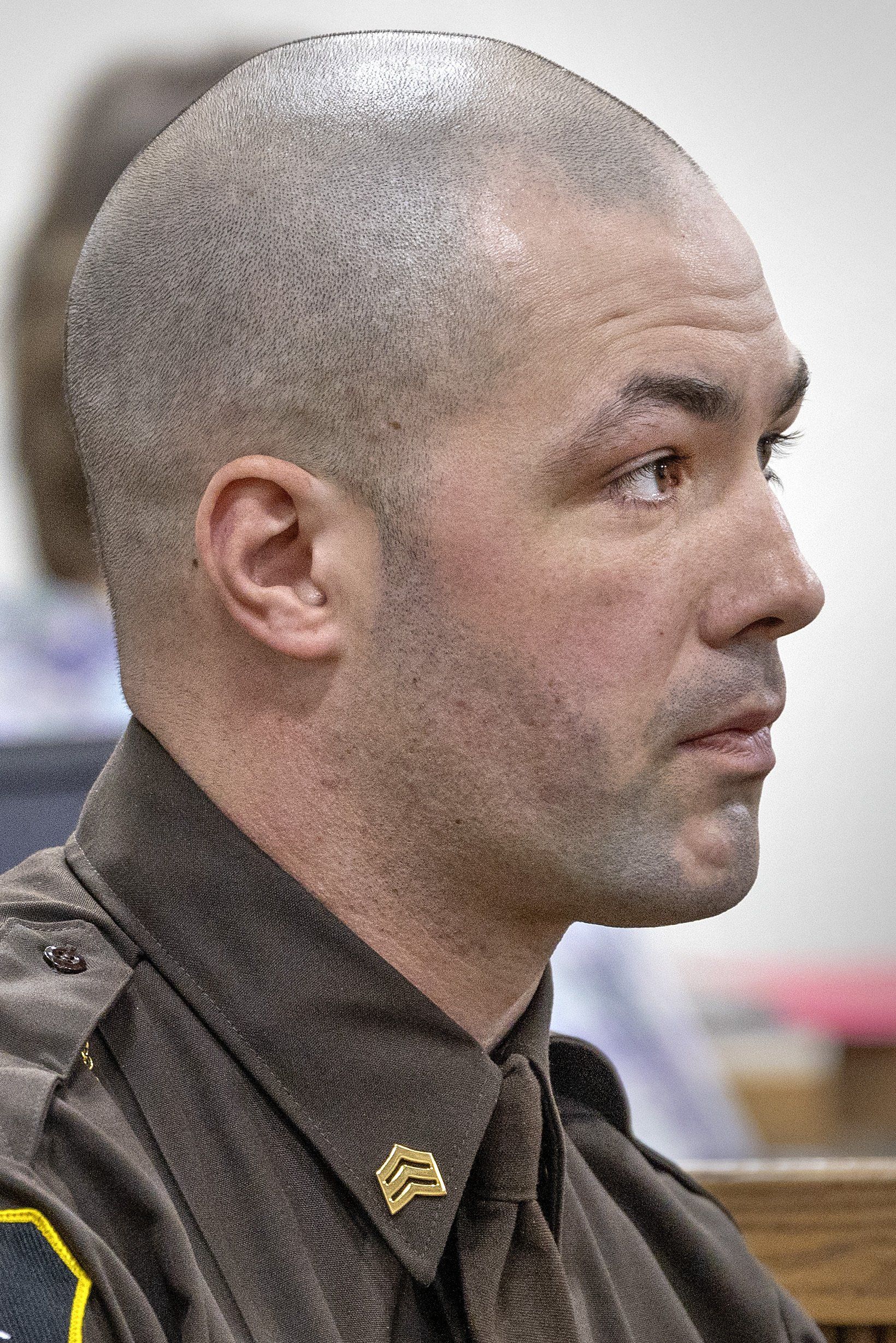
Sgt. Scott Ware with the Barry County Sheriff’s Department received the 2022 Police Officer of the Year Award for his actions during an Aug. 4, 2021, car chase and shootout in Woodland. Ware was recognized by the Police Officers Association of Michigan at its annual convention in Grand Rapids. “For bravely putting the lives of others before his own by stopping an armed shooter before he could do any real harm, Sgt. Scott Ware is one of the Police Officer of the Year award recipients,” a press release reads. “The teamwork of all officers on the scene and the courageous, tactical decisions of Sgt. Ware allowed the whole incident to end without any civilian or police officer casualties.” Undersheriff Jason Sixberry said the department is lucky to have Ware. “Scott’s done a great job here and with everything he’s done to keep the community safe,” Sixberry said. “We’re proud of him and his accomplishments and him receiving the award. It’s a pleasure of ours to have him go from a deputy up to a sergeant position, being able to instill his good values and hard work ethic in the department.” The encounter started when police were alerted that Timothy Riddle was suspected of stealing two shotguns from a Hastings resident on the 1000 block of North Coville Road. Police in the area were notified to keep a lookout for Riddle. A Hastings City Police officer saw Riddle’s vehicle at a gas station on M-43 in Hastings at 6:48 p.m. that night. Riddle was stopped by police as he was leaving the station. When police started to question Riddle, he grew agitated and sped off, heading north on M-43. Police reports and testimony in court said Riddle reached speeds as high as 115 mph. Officers from the city police and the sheriff’s department, including Ware, joined the chase. Police reported that Riddle pointed a shotgun out the window at pursuing officers throughout the chase. The chase ended at the Mobil gas station parking lot on M-43, east of Woodland. Police reported that Riddle leveled a shotgun at officers after exiting his vehicle and began approaching them. Ware, who was still inside his police cruiser, readied a rifle and fired several shots through the windshield of his vehicle. Those actions are credited with causing Riddle to stop shooting and retreat into the gas station. One customer escaped and two employees hid inside the store. They later were able to leave the station unharmed, police report. Riddle barricaded himself inside the station for seven hours while police negotiated with him. The standoff ended at 1:30 a.m. when Riddle surrendered himself to police. He was later convicted of 21 criminal counts. During Riddle's trial, Barry County Judge Michael Schipper reviewed the incidents as they had occurred that day. Remarkably, the judge pointed out, no one was hurt. That was because of the police officers who responded to the scene, he said. And Ware was a key reason for that, according to the police officers association.
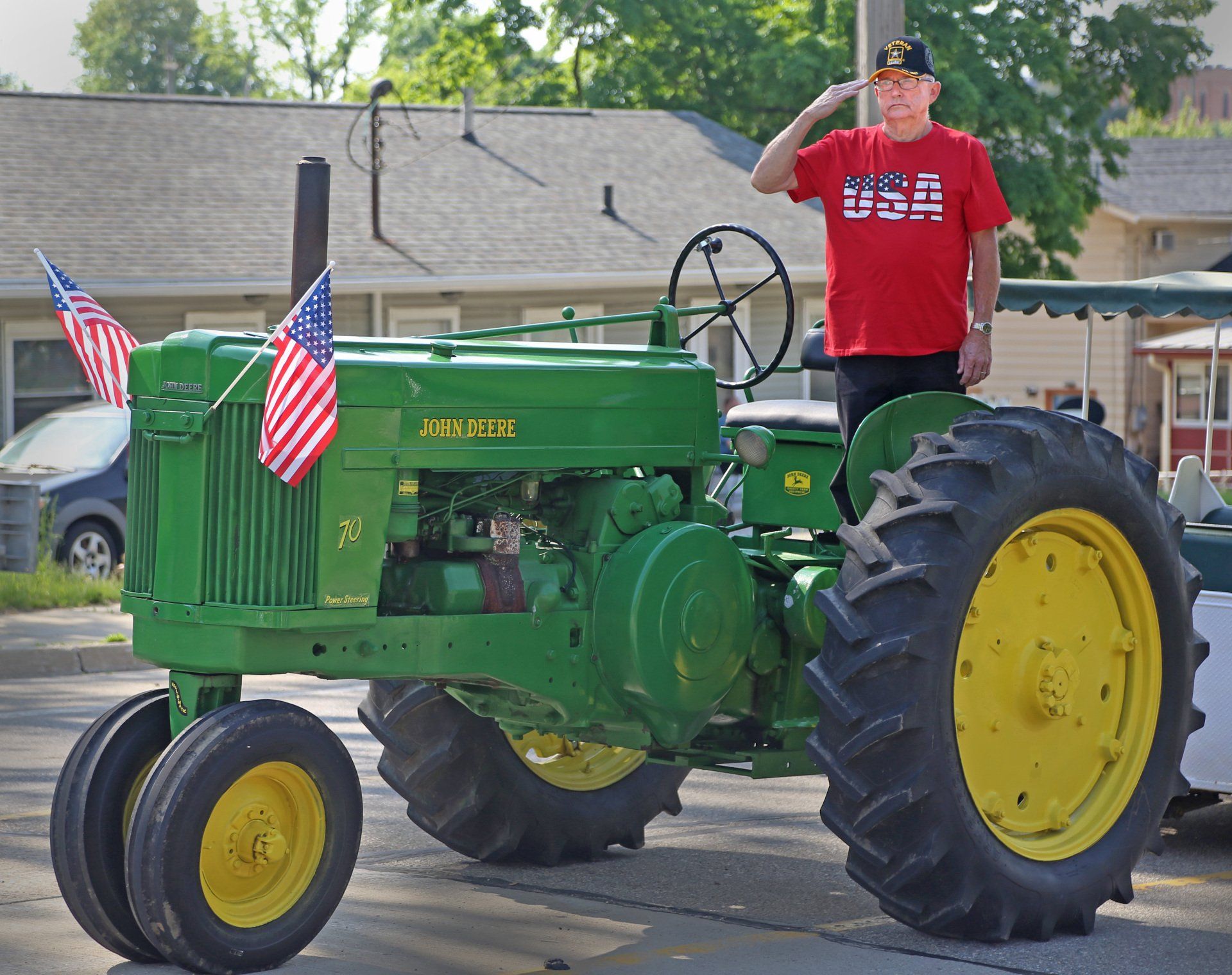
Despite a near 90-degree forecast, a strong breeze from the south kept participants and spectators comfortable as the annual Memorial Day parade wound through Hastings Monday morning. The event, hosted by Lawrence J. Bauer American Legion Post 45, made its traditional stops, pausing at Tyden Park and the bridge over the Thornapple River before ending at Riverside Cemetery. The parade stepped off at 9:30 a.m. from the intersection of Boltwood and State streets, with the Legion’s color guard, followed by the honor guard, Legion members and other veterans, National Guard and Reservists, Legion Auxiliary, Legion Riders, the local Disabled American Veterans chapter members, Sons of the American Legion, Scouts, Hastings Area Schools Marching Band and other participants. They walked through downtown, making their way to the Veterans Memorial at Tyden Park, where attendees heard a speech from Steve Carr, an Air Force veteran. Carr served as the commander of Post 45 for three years before taking over as the current Michigan District 4 forward commander. He began his speech by honoring the final 13 U.S. service members who lost their lives in Afghanistan. He shared a little bit about each person – their names, where they came from and details about their lives. “Not only are these diverse men and women forever in our hearts, but for those who knew him, they are forever young,” he said. “They came from every background, yet they shared a common goal: To serve America and make life better for others.” Carr went on to highlight the importance of Memorial Day. “Memorial is not about picnics and parades, though there is nothing wrong with enjoying and celebrating our American way of life,” he said. “Memorial Day is about gratitude and remembrance. It is about honoring the men and women who made it possible for us to gather here today in peace. But the reason there is a Memorial Day, the reason we gather here, is to remember who made our way of life possible. They truly are the guardians of our freedom.” Following Carr’s speech, two wreaths were placed at the memorial. One wreath honored all veterans and the other honored prisoners of war and those still missing in action. The group then made its way to the bridge on Broadway, where a wreath was tossed in Thornapple River to honor those who have served or are serving at sea. Both stops included a rifle salute by the Post 45 honor guard, followed by playing of taps by two Hastings High School band members. The parade then moved to Riverside Cemetery where a brief ceremony took place, as it has for many years, near the Grand Army of the Republic marker, beyond the Avenue of Flags. Those 43 flags, Jim Atkinson pointed out, were donated by the families of 43 veterans, who were presented the flags at the time of the veteran’s death. Throughout the large cemetery, Atkinson said, another 500 or so small U.S. flags mark the graves of veterans buried at Riverside. As in the past, local Scout groups helped place the flags in recent weeks. Youngsters and adult volunteers finished the work in about an hour and a half, a grateful Atkinson said. Unlike in years past, a wreath was not placed on the grave of the most recently deceased veteran at Riverside. Dr. Paul Sweetland, who served in the U.S. Army’s 82nd Airborne during the Vietnam War, died in early March. Atkinson said full military honors were conducted during Sweetland’s burial just a few weeks ago. So, the wreath placed at the GAR marker was the final wreath placed Monday. Barry Wood, recent commander of the state American Legion and a Hastings resident, spoke for a few minutes. Like Carr, Wood reminded people of the purpose of Memorial Day. “This is the day we pay homage to all those who served in the military and did not come home. This is not Veterans Day. This is not a day for celebration. It’s a day for solemn contemplation over the cost for our freedom. “Memorial Day was born of necessity. After the American Civil War, a battered United States was faced with the task of burying and honoring the 600,000 to 800,000 Union and Confederate soldiers who had died in the single bloodiest military conflict in American history. “The first national commemoration of Memorial Day was held at Arlington National Cemetery on May 30, 1868, where both Union and Confederate soldiers are buried. “Every veteran takes this oath,” Wood continued. “The ones we honor here today make the ultimate sacrifice while carrying out this oath. “Veterans, you will remember this, and I quote: ‘I do solemnly swear that I will support and defend the Constitution of the United States against all enemies, foreign and domestic; that I will bear true faith and allegiance to the same; and that I will obey the orders of the president of the United States and the orders of the officers appointed over me, according to regulations and the Uniform Code of Military Justice, so help me, God.’ “We here today thank and honor those veterans who took this oath and cannot be here. Each veteran here, and those across this nation, understand what taking this oath means. It is a gift, or a pledge, of their lives to you and to all in the United States of America. That oath is a major part of who we are in the military. It forms the bedrock of what we stand for and … are willing to fight for. “Some of you may know a soldier, airman, sailor or marine who did not come home: “I am an airman. I do not choose the time or place. Convenience is not in my vocabulary. “I’m a soldier. I stand at the ready. When my orders come, I go. “I’m a sailor. The job I’m given to do, I do. Even if it costs me my life, I will do it. “I am a marine. Yes, take me home, but only when the job is done, only when the job is done. “I pray for each family that has lost a veteran, never having a chance to say ‘good-bye.’ “Let us never forget,” Wood concluded.
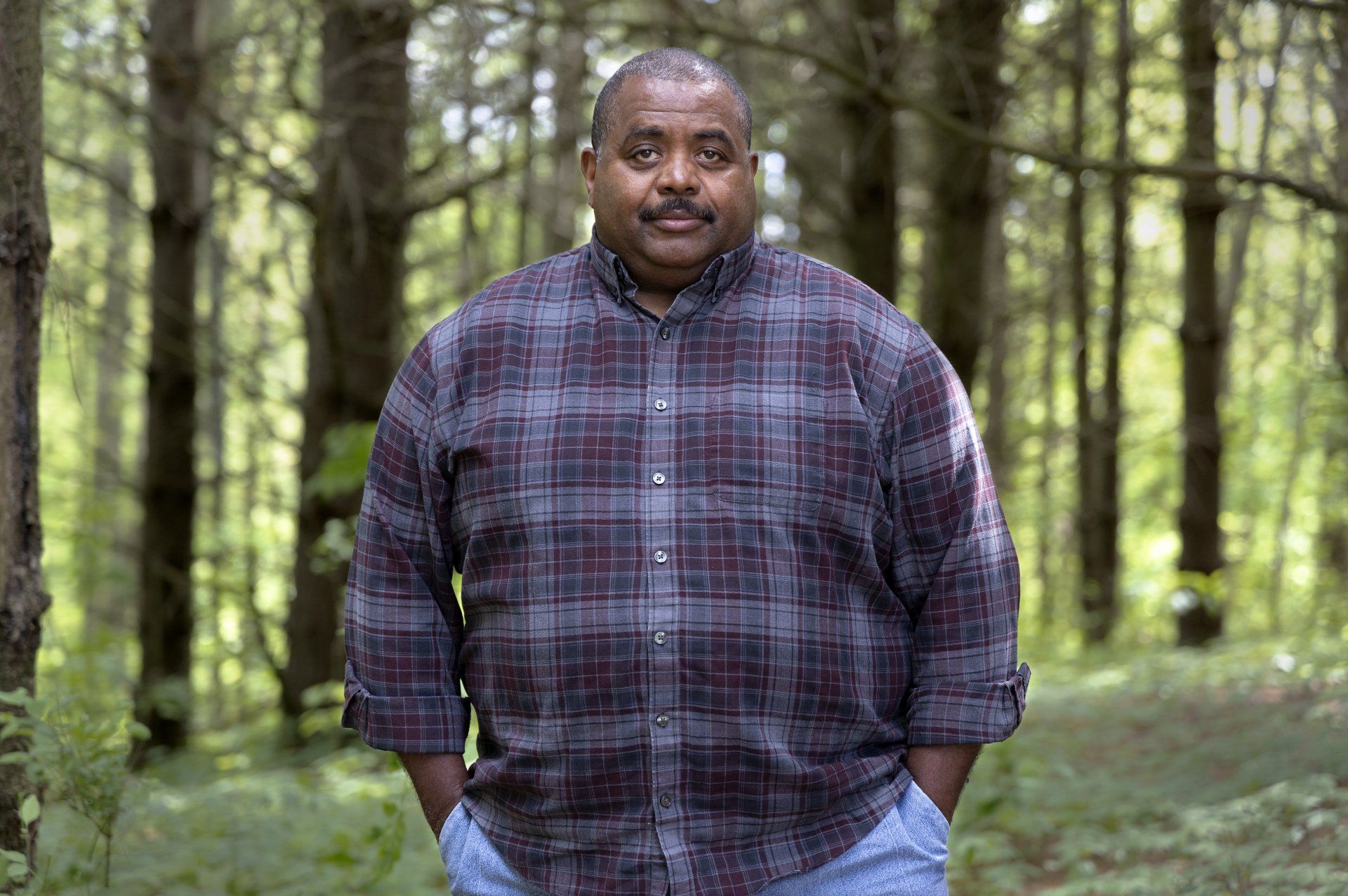
They told him Black people didn’t live in Barry County, but Darryl Newton didn’t care. One day in 1997, his wife, lost in the backroads of Barry County, stumbled on a house. It sat at the end of a dead-end gravel road surrounded by woods. She called him right away. She told him she had found their house. Despite warnings about Barry County from his coworkers at Meijer in Grand Rapids, Newton has lived in Barry County for 25 years. He refers to the county as “Barry,” as if it’s a longtime friend. He cherishes the peace, the quiet and the fact that he doesn’t feel pressure to always lock his doors. It’s where he has raised his kids, sent them to school and, as a self-described “football nut,” logged nearly two decades as a football coach. For five years, he volunteered with the Hastings youth football program, spending every Saturday, 8 a.m. to 8 p.m., coaching, announcing and serving up food. People still know him as the “pickle guy” because he stocked the snack stand with this fan favorite. Later, he would coach football in Middleville for 12 years, serving as both the president and vice president of the youth league. “It's a great community. I’ve loved living here, it’s just...” he said, pausing and sighing, “you have to get used to it.” Darryl Newton is a 59-year-old man from Ypsilanti who cheers for the Philadelphia 76ers, likes to hunt, loves to grill, served in the military, goes to church and lives in Barry County as a Black person. He could work in Barry County and live in Grand Rapids, Lansing, Battle Creek or Kalamazoo. Each has a larger Black community, but he chooses to live in Barry County, which is 96.6 percent white and 0.7 percent Black. Hastings is just 0.1 percent Black. The Hastings Banner spent more than a month with Black residents in the community to learn more about their daily experiences in Barry County. Many said they enjoy living here and, for the most part, people in the community treat their families with kindness and decency. But many admitted to feeling like outsiders. All have experienced some form of racism. There’s one memory that sticks with Newton. A few weeks after arriving in Barry County, Newton’s son came home with bumps and bruises. As he had walked in Hastings, a few kids picked a fight with him. They called him a racial slur typically directed at Black people. But Newton wasn’t surprised. “This is normal, it's going to happen,” he told his wife, “and it's going to happen to him again. And again.” Growing up in Barry County Isaac Schipper was the only Black student in his grade from first grade to high school graduation at Thornapple Kellogg Schools. And everyone knew it. “Oh, that's Isaac,” other students would say when new people visited the school, “you'll recognize him right away. He sticks out.” “That's just a fact of living out here,” Schipper said. “Black people stick out like a sore thumb.” Schipper, 29, was adopted by white parents. His father is Barry County Judge Michael Schipper. Isaac identifies as bi-racial, with white and Black biological parents, although he said most people see him as Black. He graduated from Thornapple Kellogg in 2011, where he was a lineman on the 2010 all-conference football champion team. He attended Grand Valley State University and studied psychology – a result of “years of watching ‘Scrubs,’” he said. He spent a few years working in a hospice facility, but the experience left him burnt out and he started to think about a new career. In 2017, he took a job working in cafeterias in the Grand Rapids Public Schools and, in 2018, enrolled at Ferris State University to pursue a teaching degree. Before leaving Barry County, Schipper never really spent much time around other Black people. “There's not really any kind of Black culture out here is the best way to put it,” Schipper said. That changed when he moved away from Barry County. Going to college, working in Holland and living in downtown Grand Rapids made him more aware of the experiences of other people of color. But Schipper said he has never felt unsafe or threatened in Barry County. “There haven’t been a whole lot of racial encounters,” he said. He would recommend Black people live in Barry County. Schipper continues to live in Barry County while he works as a substitute teacher at Thornapple Kellogg. After finishing his degrees, he wants to return there permanently to teach in his childhood district, hopefully in fourth or fifth grade. Still, there’s one instance of racism that Schipper remembers: When he tried to date a girl. They started by flirting in gym class. They became close and Schipper visited her house, where her father watched his every move. Eventually, Schipper asked her to date. But she made excuse after excuse. After a while, she told him the truth – her father “didn’t feel comfortable” with them dating because of his skin color. Over the following year, her father became more comfortable with Schipper, but it was a revealing moment for him. “No one's going to say, ‘Oh, I'm against diversity,’ until it affects their lives personally,” he said. Blending in From the age 7 to 17, Vincente Relf Jr. never lived in a place for more than two years. Financial troubles, family disagreements or a change in jobs -- something always caused his family to relocate. He bounced around from Detroit to Southfield to Dearborn, even living in a shelter for a short period of time. In each place, he had to learn how to fit in. Relf, 26, calls himself a “chameleon.” “My whole life story is blending in, dude,” he said. A few weeks into his junior year of high school, Relf packed his life into five Kroger tubs and moved in with his sister in Grandville, a suburban community near Grand Rapids. Grandville required a different type of blending in. In Dearborn, his school was split almost evenly between white, Black and Arab students. In Grandville, he said there were maybe 20 Black people in the entire district and not many other people of color either. He felt the lack of diversity from the moment he arrived. People assumed he knew how to break into cars. One classmate said that she didn’t understand him because she “didn’t speak Black.” But Relf wanted to fit in. “I wanted to feel like I belonged because I live here now,” he said. “This is my home. I have to find a way of belonging. People are more accepting when you talk like them, sound like them, look like them, right?” Relf threw away his old clothes. When he walked home from school, he practiced speaking without slang. Relf said it gets exhausting, having to constantly code switch and change. But he said he “had to adapt to survive.” “I wanted to give people that different experience and I knew that when people saw me, if I talked the way that I talked, they were immediately going to categorize me as the Black guy they see on the news that has committed this crime,” he said. In 2018, Relf graduated from Davenport University with a degree in business management. Looking to buy a house and build some equity, he stumbled onto a place in Middleville with a big lot and the perfect amount of natural light. In September 2020, he made Middleville his home. In the back of his head, he wondered if he would find racial epithets scrawled on the front of his house. Within weeks, though, he felt more welcome. A local basketball coach invited him to play pick-up. Unprompted, a neighbor who looked like Santa Claus would plow his driveway after it snowed. Relf calls a different neighbor “the greatest guy ever.” Occasionally he’ll get the “oh, crap, there’s a Black guy in Middleville stare.” But he said that he “loves living in the country.” He loves the quiet, abundant space and having a home to call his own. When Relf calls his family in Detroit, he doesn’t think about how he speaks. But as he walks in Middleville, Relf said he is always conscious of how people see him as a Black man. “I'm always Black,” Relf said. “I will always be Black. I'm always aware that I'm Black. I don’t know, it’s just something I’m always aware of. I’m never not Black.” For the most part, Relf sticks to himself in Barry County. When he wants to do something fun, he heads to the Grand Rapids area. The summer concerts and downtown events here don’t appeal to him, and when he looks around, he sees no one who looks like him. “I feel like there's a community,” he said. “I just don't know if I feel a part of the Middleville community.” ‘Just wading in the water’ At church this past weekend, they shared petitions for prayer. As Desiree Holley-Sancimino sat in her pew, she couldn’t help but think about the Buffalo grocery store, where 10 Black people were murdered May 14 by a gunman under the sway of white supremacist ideologies. “The climb is very hard,” she said. “I cry out to the Lord, when is it going to end? Then we got this shooting in Buffalo now. This guy comes 200 miles away, he's checking out the climate, what people are shopping at the store and then sets up to murder people just because they're of a different color.” The prayer petitions asked for “hate to stop in the country.” They mentioned Ukraine. But none directly discussed the heinous shooting in Buffalo. Holley-Sancimino was disappointed. “We have to acknowledge that it exists,” she said. “We can't push it aside or use vague language.” Holley-Sancimino, 69, has witnessed and experienced racism during her entire life. Her great-great-great-grandfather woke up one morning in Mississippi to a burning cross on his front yard. After Holley’s grandparents came to Detroit, Holley-Sancimino’s mother was denied a job because her skin was “too dark.” Her brother was later bussed to a new school and told to “go back to Africa.” Holley-Sancimino has continued to deal with racism, even in Hastings. In the fall of 2021, her 11-year-old granddaughter was called a “dirty girl” as she stood on a sidewalk downtown. Holley-Sancimino called moving to Hastings a “culture shock.” She was born in the 1950s in Detroit, where she lived with Black, Italian, Lebanese, Polish, Asian and Mexican people. Diversity, she said, is the “spice of life.” “I've always loved diversity,” she said. “You gain so much when you live with people that are different from you and learn about their experience and where they came from, eating their food.” She lived in Detroit until she was 48. Then she bounced around between Athens, Ala., Atlanta, Denver and Detroit. She reconnected with a friend at a high school reunion and that friend became her husband. In 2019, Holley moved to Hastings to live with him. Since settling in Hastings, she has found comfort in her friendship with “five lovely ladies” and events like the Thornapple Arts Council Jazz Festival. Every Sunday, she sings in her choir. Holley-Sancimino wants to be a voice for change in Hastings. She shared the incident with her granddaughter in a letter to the editor to The Hastings Banner. During the summer of 2020, she spoke at an event for racial equity in downtown Hastings. She stresses the need for more diverse representation in schools and on the city council, and she has called on ministers to speak more about race from the pulpit. She participates in a regular community dialogue called “Roundtable Companions for Racial Equity” at Emmanuel Episcopal Church where they read books, talk about race and share “lots of tears.” Holley-Sancimino doesn’t want to hide. During an interview, she wore a hat that reads “Black Barbie” in pink, bedazzled letters. She likes to put on her Black Lives Matter shirt. “I don't care,” she said multiple times. Walking around town, Holley-Sancimino said she doesn’t feel unsafe. But she doesn’t always feel welcome or at ease either. That is especially true at community events, where a lot of people gather, but few of them are Black. “I'm just wading in the water,” she said. Whenever she sees a Black person, she stops them – on their porch, in the B2 Outlet Store or wherever she finds them. “We just talk, you know?” she said. “Not that we’re gonna agree on everything. But you got somebody that looks like you.” ‘So much pressure’ When Kenneth Jefferson enters a store, he runs through a mental checklist. No hoodie, no hands in his pockets. He says please and thank you, he always holds the door and he never, ever raises his voice. “100 percent manners everywhere I go,” he said. Black people, he said, “don't get a lot of chances,” and he is always cognizant of how he looks, talks and acts. He never wants to be seen as threatening. Sometimes Jefferson, 46, wishes he could read people’s minds. He wishes he could know what they are thinking when he cheers at a basketball game or passes them in a store. He wishes he could know how they perceive him and what makes them nervous when he is around. “I care. I shouldn't but I care,” he said. “I want to make everybody happy. I want to make everybody comfortable, which you can't. But I’m that person. I've always been a pleaser. One person uncomfortable makes me uncomfortable.” At the age of 4, Jefferson moved from Detroit to a 40-acre farm in Allegan, where his family was one of few Black people. They had an acre-and-a-half garden, cows, chickens and 800-pound pigs, the largest in the county at the time. Still, they had little money. Occasionally, their water or electricity got shut off and they had to boil snow for water or turn on the stove for heat. Jefferson would go on to graduate from college – the first in his family. As a young adult, he dabbled in modeling. He has worked as a coordinate-measuring machine operator and a junior quality engineer at an engineering plant. Later, he served as a radiological technologist for Spectrum Health. In 2010, Jefferson moved to Barry County. Twelve years later, he still doesn’t feel comfortable. “It wasn’t as scary as it is now,” he said 12 years later. He recalls being stopped by a state police officer while running in his neighborhood. Another time, cops were called to the high school when he was playing basketball with friends, some Black. In the Walmart parking lot, a person rolled down their car window and aimed a finger gun at him. The person, Jefferson later realized, lived down the road from him. Then, there are the everyday moments that make Jefferson feel like an outsider. The mental checklist he runs through when he walks outside. The overwhelming stares he receives when he walks into a store or a restaurant or a golf outing. “So much pressure,” he said, his voice quivering and exasperated. But Jefferson doesn’t plan to leave Barry County. This is where he has built a life for himself, where he plays basketball, golfs and fishes. During COVID, he built a green room in his garage, growing bell peppers, jalapenos, chili peppers, basil, strawberries, lettuce and onions. He wants to share with people in Barry County what it is like to be Black. Really, though, Jefferson doesn’t think his experience would be different anywhere else. This is just his reality of being Black in America. “I don't have anywhere else I would want to go. There's no city that, like, ‘Oh, I'm gonna go here and have a better life.’ … I think that, um,” he said, pausing to think, “yeah, I know, and that's a weird answer. I don't think anywhere else will change. That's who I'm supposed to be, just being a Black person.” What needs to change? As he waited to pick up his kids at St. Rose Elementary School, a little girl sprinted toward Darryl Newton, the former youth football coach who has lived in Barry County for 25 years. “I know you, I know you,” she said, with the biggest and brightest eyes. “I looked at her and said, ‘Well, how do you know me, honey?’” Newton remembered. “You’re Nick’s Black daddy,” she said. Heads turned. Parents rushed over. Everyone yelled, “Shush!” But Newton told them to stop. He saw a teaching opportunity. “Don’t correct her,” he said. “She’s talking about what she sees. Here's the point: I am Nick's daddy, and I am Black. And the minute you tell this young lady that ‘shhh, don't call him Black,’ then what you're saying is there's something wrong with him being Black.” “…Don't ever shush that because you're gonna say that something's wrong with me. And there's nothing wrong with me. “I always found in Barry County – if you don't get yourself riled up – that there's an opportunity to educate.” Newton’s schoolyard encounter underscores what other Black residents in Barry County said: Race and, more specifically, the experiences of Black people, are rarely discussed outside of their own homes. Some people are trying to create that public conversation. The Barry County Chamber of Commerce and Economic Development Alliance and Leadership Barry County, for example, created a program called “Courageous Conversations,” designed to discuss diversity issues. They are focused on creating videos with more diverse representation and developing a cohort called the “Flourish Group” for people who do not feel like they belong in Barry County. “It's very much on the forefront of all of our minds that we're trying to make Barry County more inclusive,” Chamber President/CEO Jennifer Heinzman said. As a learning and development specialist with Meijer Inc., Newton focused on teaching diversity for employees. He said that Barry County needs action related to racial equity, such as increased diversity on school boards. But, at the bare minimum, Newton believes change begins with more discussion. It begins with more public effort to learn from and acknowledge the experiences, bad and good, of Black people. It requires a thoughtful investigation into why Barry County looks the way it does, Newton said. Why a place so close to Grand Rapids, the second biggest city in the state, has a Black population of just 0.7 percent. “It's seeing what's not there that's more important,” he said. “And then ask yourself, but why? Why is that not there? And what are we missing from not having that there?”

